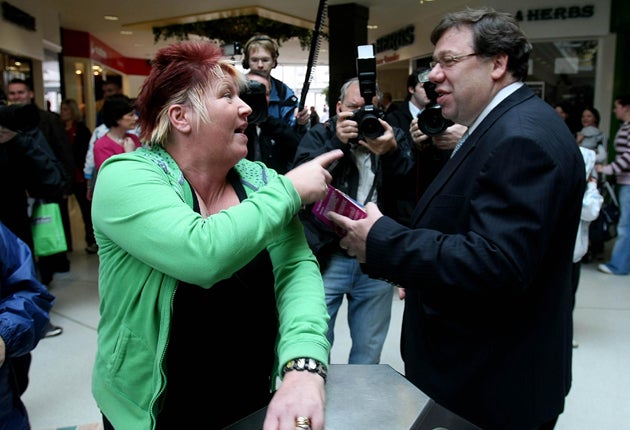Major Irish parties united in hoping for a Yes vote to Lisbon
Soaring unemployment is causing voters to look more favourably at the treaty

Your support helps us to tell the story
From reproductive rights to climate change to Big Tech, The Independent is on the ground when the story is developing. Whether it's investigating the financials of Elon Musk's pro-Trump PAC or producing our latest documentary, 'The A Word', which shines a light on the American women fighting for reproductive rights, we know how important it is to parse out the facts from the messaging.
At such a critical moment in US history, we need reporters on the ground. Your donation allows us to keep sending journalists to speak to both sides of the story.
The Independent is trusted by Americans across the entire political spectrum. And unlike many other quality news outlets, we choose not to lock Americans out of our reporting and analysis with paywalls. We believe quality journalism should be available to everyone, paid for by those who can afford it.
Your support makes all the difference.Voting in Ireland on the EU's Lisbon Treaty seemed to start sluggishly yesterday, in spite of official pronouncements that the outcome of the referendum "will determine the future direction of our country".
Irish voters had the choice of opting for Ta (Yes) or Nil (No) on whether the treaty, which is intended to shape the EU's future, should be ratified.
The major Irish parties, and the European establishment in general, are anxiously hoping that the opinion polls which indicate a Yes vote will prove to be accurate.
That would give the go-ahead for a thorough overhaul of the way the EU does its business. A negative vote, by contrast, would be regarded in Europe as a major complication in reforming its institutions.
Last year the No campaign won out, to the consternation of Brussels, and many months were spent on planning the current re-run. A series of reassurances was given in the hope of calming the fears of voters who worried about the treaty's implications for issues such as military conscription and abortion.
This time round the entire context has been changed by the near-collapse of the economy of the Republic of Ireland, which has been particularly hard-hit by the global recession.
Unemployment has soared, as was illustrated by the fact that the most striking example of queueing in Dublin was not outside polling stations but in O'Connell Street, where more than 1,000 job-seekers stood for hours.
Many of them newly unemployed, they were hoping to get part-time temporary posts over the Christmas period with Marks & Spencer, whose spokeswoman described the response as "incredible." One thousand turned up on Thursday and several hundred more yesterday.
Against this background, it may well be that a fair number of voters will be swayed by the argument that Europe has already been helpful to the Republic in its time of economic need, and that they should not take the risk of losing friends.
In last year's contest many voters felt they had the freedom to oppose the treaty without suffering any tangible penalty. This time the country is in such evident need of money and goodwill that the Yes side seems set to benefit.
A No vote would certainly be greeted with dismay in Brussels. In Dublin, meanwhile, such an outcome could even bring down the Prime Minister, Brian Cowen, whose rating in opinion polls is perilously low. He has said he would not resign in such an event, but most voters have been unimpressed with his track record on the economy – he was finance minister before becoming Prime Minister – and his failure to deliver a Yes vote would leave him highly vulnerable.
He has been to the fore in the Yes campaign, attempting to appeal to voters who are distinctly unenamoured of him. Opposition parties who support Lisbon have been placed in the counter-intuitive position of whole-heartedly agreeing with him.
The opposition leader, Enda Kenny, said: "I know people are very angry. I have stressed time and again – sometimes until I'm blue in the face – explaining that they should hold their fire on the government and not take out their vengeance on the Lisbon question."
The only sizeable party campaigning against Lisbon has been Sinn Fein, which declared: "This is a bad treaty negotiated by an incompetent government which will seriously undermine Ireland's position. If we hand power away, we won't get it back."
Although a No vote would create much uncertainty, Mr Cowen has firmly ruled out having a third referendum.
Join our commenting forum
Join thought-provoking conversations, follow other Independent readers and see their replies
0Comments